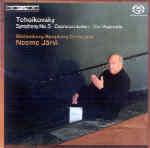After a couple of relatively unimpressive releases in what should have been a fine Tchaikovsky cycle, Neeme Järvi and the Gothenburgers hit their stride and turn in a generally excellent Fifth Symphony. The first-movement exposition takes a few minutes to settle down, largely due to Järvi’s somewhat casual approach to rhythm, but once the music gets going it’s smooth sailing, with lively tempos and really beautiful sonics (in both stereo and SACD multichannel formats) that make listening a genuine pleasure. The andante features some attractive solo work from principal horn and clarinet, and rises to an impressively passionate climax–but it’s the elegant third movement and the finale that impress the most. The latter in particular has tremendous drive and excitement–and a cogency in its repetitious central development episode–that many performances lack.
Making the disc even more attractive are two equally distinguished couplings: a lively Capriccio italien (though not quite as thrilling as the recent Gatti on HM), and the rarely-heard but eminently worthwhile tone poem The Voyevoda. It may be possible to do slightly better in the symphony, but it’s hard to imagine anyone not finding plenty of pleasure in this release.
































